Company Law Report: Fiduciary Duties in Company and Partnership Law
VerifiedAdded on 2022/09/18
|7
|1223
|23
Report
AI Summary
This report provides a comprehensive analysis of fiduciary duties within company and partnership law, crucial for understanding business structures. It explores the legal obligations of directors under the Corporations Act, referencing key sections and relevant case law such as ASIC v Flugge (No2) [2017] and Greenhalgh v Arderne Cinemas Ltd [1951]. The report also examines fiduciary duties in partnerships, including the duty of care, good faith, and full disclosure, citing Birtchnell v Equity Trustees Executors & Agency Co Ltd [1929]. Furthermore, the report offers practical advice to clients by analyzing the case of ASIC v Vizard [2005], highlighting director responsibilities and potential breaches of fiduciary duties, such as misuse of confidential information. The report concludes by emphasizing the implications of these duties and the importance of adhering to legal standards in both company and partnership structures.
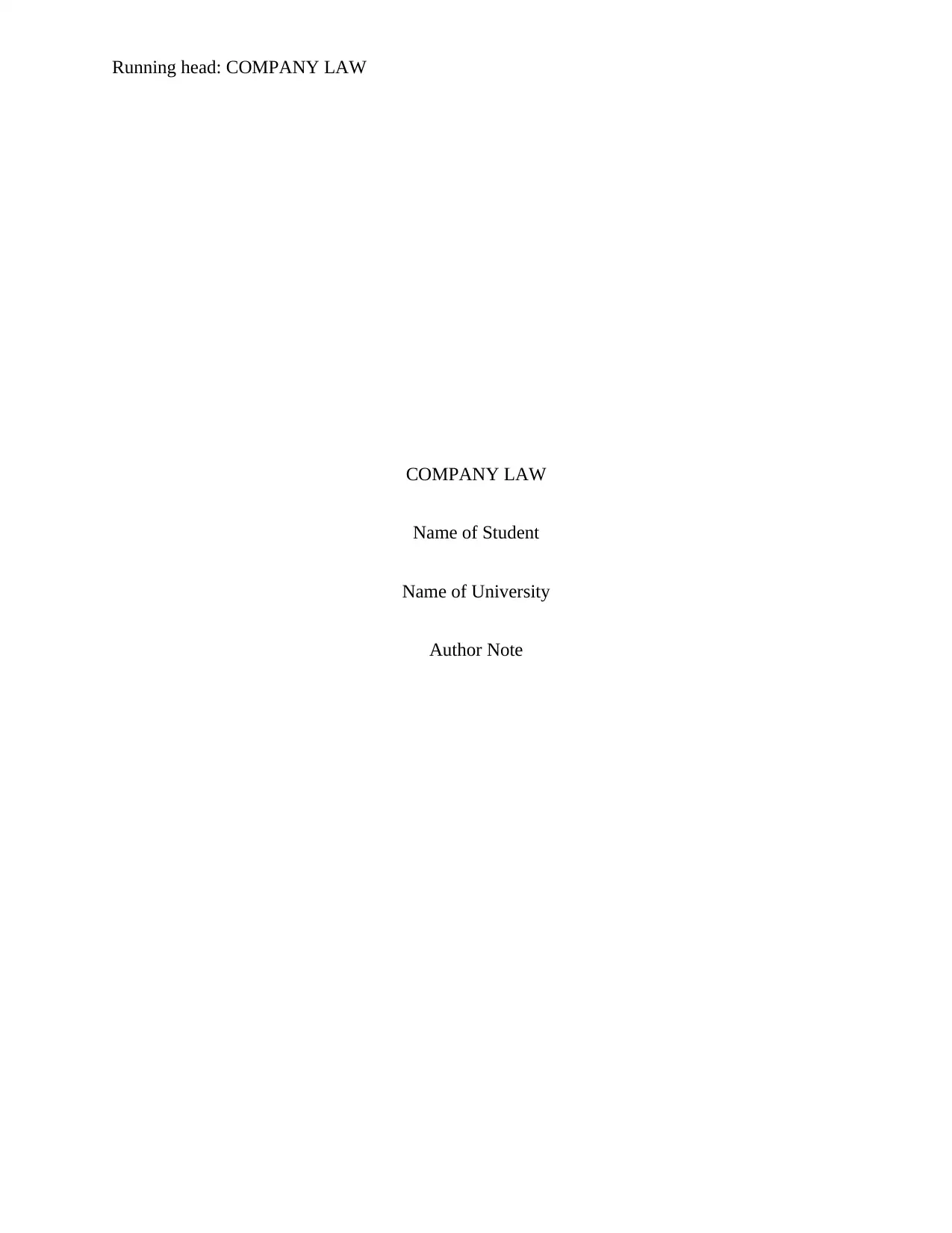
Running head: COMPANY LAW
COMPANY LAW
Name of Student
Name of University
Author Note
COMPANY LAW
Name of Student
Name of University
Author Note
Paraphrase This Document
Need a fresh take? Get an instant paraphrase of this document with our AI Paraphraser
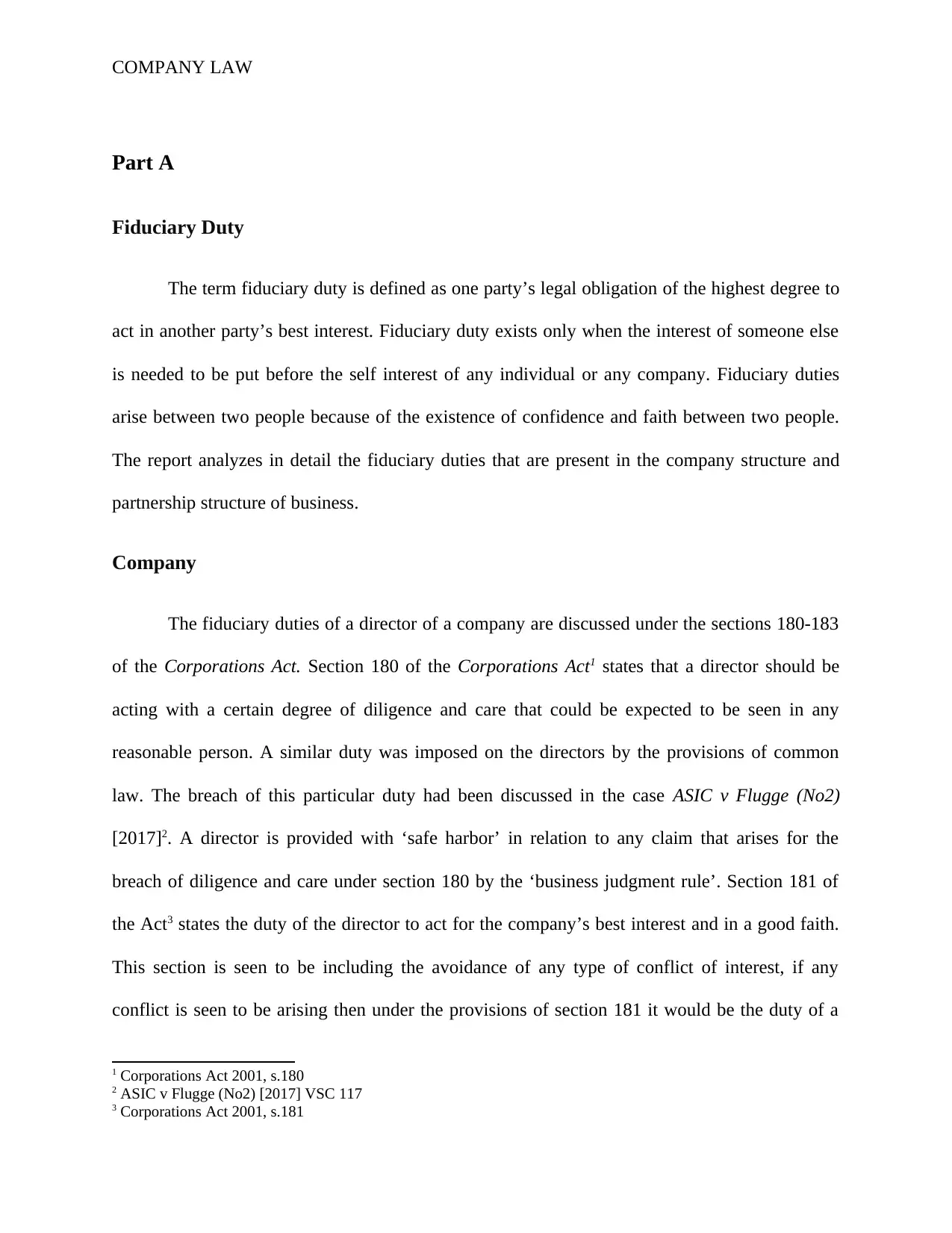
COMPANY LAW
Part A
Fiduciary Duty
The term fiduciary duty is defined as one party’s legal obligation of the highest degree to
act in another party’s best interest. Fiduciary duty exists only when the interest of someone else
is needed to be put before the self interest of any individual or any company. Fiduciary duties
arise between two people because of the existence of confidence and faith between two people.
The report analyzes in detail the fiduciary duties that are present in the company structure and
partnership structure of business.
Company
The fiduciary duties of a director of a company are discussed under the sections 180-183
of the Corporations Act. Section 180 of the Corporations Act1 states that a director should be
acting with a certain degree of diligence and care that could be expected to be seen in any
reasonable person. A similar duty was imposed on the directors by the provisions of common
law. The breach of this particular duty had been discussed in the case ASIC v Flugge (No2)
[2017]2. A director is provided with ‘safe harbor’ in relation to any claim that arises for the
breach of diligence and care under section 180 by the ‘business judgment rule’. Section 181 of
the Act3 states the duty of the director to act for the company’s best interest and in a good faith.
This section is seen to be including the avoidance of any type of conflict of interest, if any
conflict is seen to be arising then under the provisions of section 181 it would be the duty of a
1 Corporations Act 2001, s.180
2 ASIC v Flugge (No2) [2017] VSC 117
3 Corporations Act 2001, s.181
Part A
Fiduciary Duty
The term fiduciary duty is defined as one party’s legal obligation of the highest degree to
act in another party’s best interest. Fiduciary duty exists only when the interest of someone else
is needed to be put before the self interest of any individual or any company. Fiduciary duties
arise between two people because of the existence of confidence and faith between two people.
The report analyzes in detail the fiduciary duties that are present in the company structure and
partnership structure of business.
Company
The fiduciary duties of a director of a company are discussed under the sections 180-183
of the Corporations Act. Section 180 of the Corporations Act1 states that a director should be
acting with a certain degree of diligence and care that could be expected to be seen in any
reasonable person. A similar duty was imposed on the directors by the provisions of common
law. The breach of this particular duty had been discussed in the case ASIC v Flugge (No2)
[2017]2. A director is provided with ‘safe harbor’ in relation to any claim that arises for the
breach of diligence and care under section 180 by the ‘business judgment rule’. Section 181 of
the Act3 states the duty of the director to act for the company’s best interest and in a good faith.
This section is seen to be including the avoidance of any type of conflict of interest, if any
conflict is seen to be arising then under the provisions of section 181 it would be the duty of a
1 Corporations Act 2001, s.180
2 ASIC v Flugge (No2) [2017] VSC 117
3 Corporations Act 2001, s.181
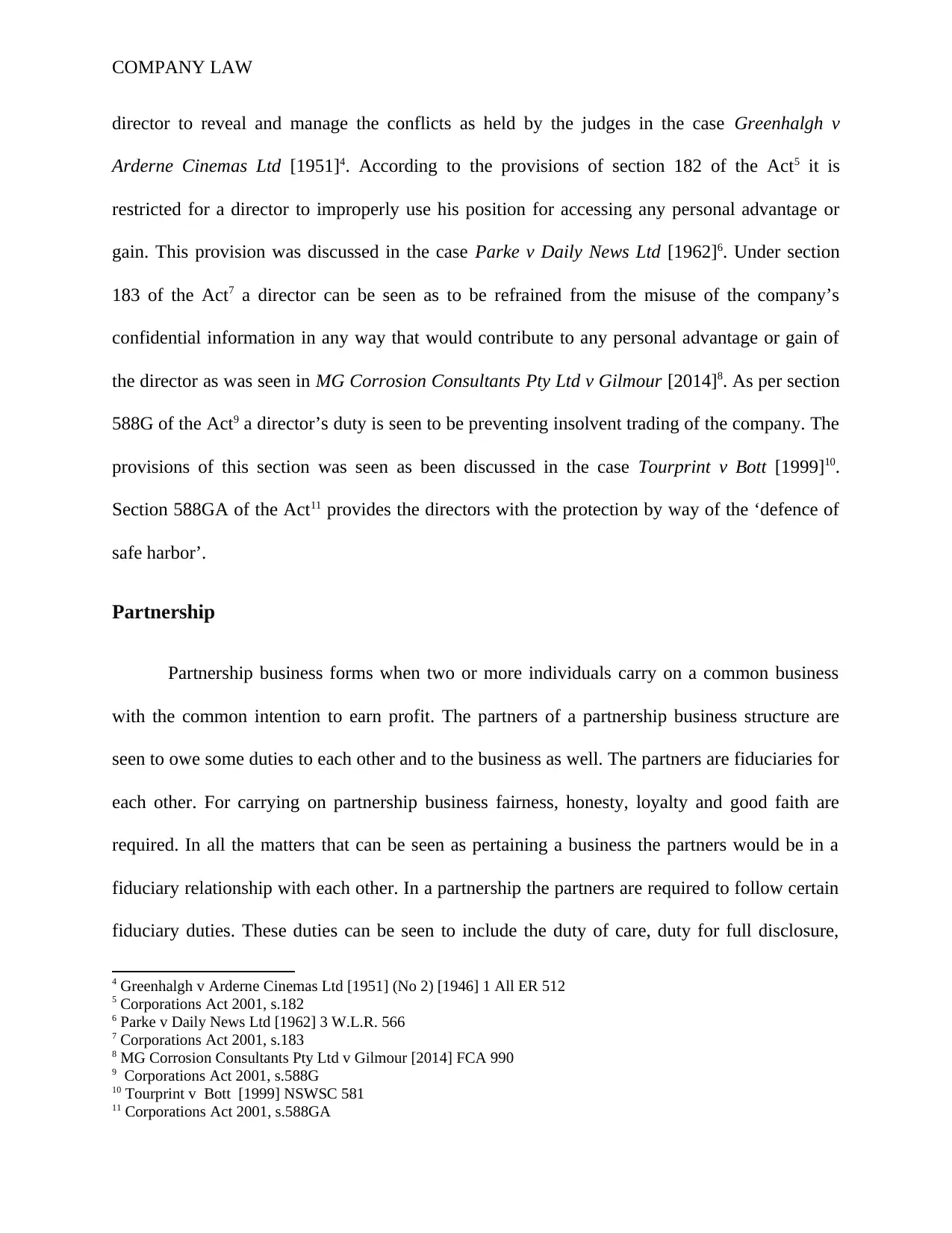
COMPANY LAW
director to reveal and manage the conflicts as held by the judges in the case Greenhalgh v
Arderne Cinemas Ltd [1951]4. According to the provisions of section 182 of the Act5 it is
restricted for a director to improperly use his position for accessing any personal advantage or
gain. This provision was discussed in the case Parke v Daily News Ltd [1962]6. Under section
183 of the Act7 a director can be seen as to be refrained from the misuse of the company’s
confidential information in any way that would contribute to any personal advantage or gain of
the director as was seen in MG Corrosion Consultants Pty Ltd v Gilmour [2014]8. As per section
588G of the Act9 a director’s duty is seen to be preventing insolvent trading of the company. The
provisions of this section was seen as been discussed in the case Tourprint v Bott [1999]10.
Section 588GA of the Act11 provides the directors with the protection by way of the ‘defence of
safe harbor’.
Partnership
Partnership business forms when two or more individuals carry on a common business
with the common intention to earn profit. The partners of a partnership business structure are
seen to owe some duties to each other and to the business as well. The partners are fiduciaries for
each other. For carrying on partnership business fairness, honesty, loyalty and good faith are
required. In all the matters that can be seen as pertaining a business the partners would be in a
fiduciary relationship with each other. In a partnership the partners are required to follow certain
fiduciary duties. These duties can be seen to include the duty of care, duty for full disclosure,
4 Greenhalgh v Arderne Cinemas Ltd [1951] (No 2) [1946] 1 All ER 512
5 Corporations Act 2001, s.182
6 Parke v Daily News Ltd [1962] 3 W.L.R. 566
7 Corporations Act 2001, s.183
8 MG Corrosion Consultants Pty Ltd v Gilmour [2014] FCA 990
9 Corporations Act 2001, s.588G
10 Tourprint v Bott [1999] NSWSC 581
11 Corporations Act 2001, s.588GA
director to reveal and manage the conflicts as held by the judges in the case Greenhalgh v
Arderne Cinemas Ltd [1951]4. According to the provisions of section 182 of the Act5 it is
restricted for a director to improperly use his position for accessing any personal advantage or
gain. This provision was discussed in the case Parke v Daily News Ltd [1962]6. Under section
183 of the Act7 a director can be seen as to be refrained from the misuse of the company’s
confidential information in any way that would contribute to any personal advantage or gain of
the director as was seen in MG Corrosion Consultants Pty Ltd v Gilmour [2014]8. As per section
588G of the Act9 a director’s duty is seen to be preventing insolvent trading of the company. The
provisions of this section was seen as been discussed in the case Tourprint v Bott [1999]10.
Section 588GA of the Act11 provides the directors with the protection by way of the ‘defence of
safe harbor’.
Partnership
Partnership business forms when two or more individuals carry on a common business
with the common intention to earn profit. The partners of a partnership business structure are
seen to owe some duties to each other and to the business as well. The partners are fiduciaries for
each other. For carrying on partnership business fairness, honesty, loyalty and good faith are
required. In all the matters that can be seen as pertaining a business the partners would be in a
fiduciary relationship with each other. In a partnership the partners are required to follow certain
fiduciary duties. These duties can be seen to include the duty of care, duty for full disclosure,
4 Greenhalgh v Arderne Cinemas Ltd [1951] (No 2) [1946] 1 All ER 512
5 Corporations Act 2001, s.182
6 Parke v Daily News Ltd [1962] 3 W.L.R. 566
7 Corporations Act 2001, s.183
8 MG Corrosion Consultants Pty Ltd v Gilmour [2014] FCA 990
9 Corporations Act 2001, s.588G
10 Tourprint v Bott [1999] NSWSC 581
11 Corporations Act 2001, s.588GA
⊘ This is a preview!⊘
Do you want full access?
Subscribe today to unlock all pages.

Trusted by 1+ million students worldwide
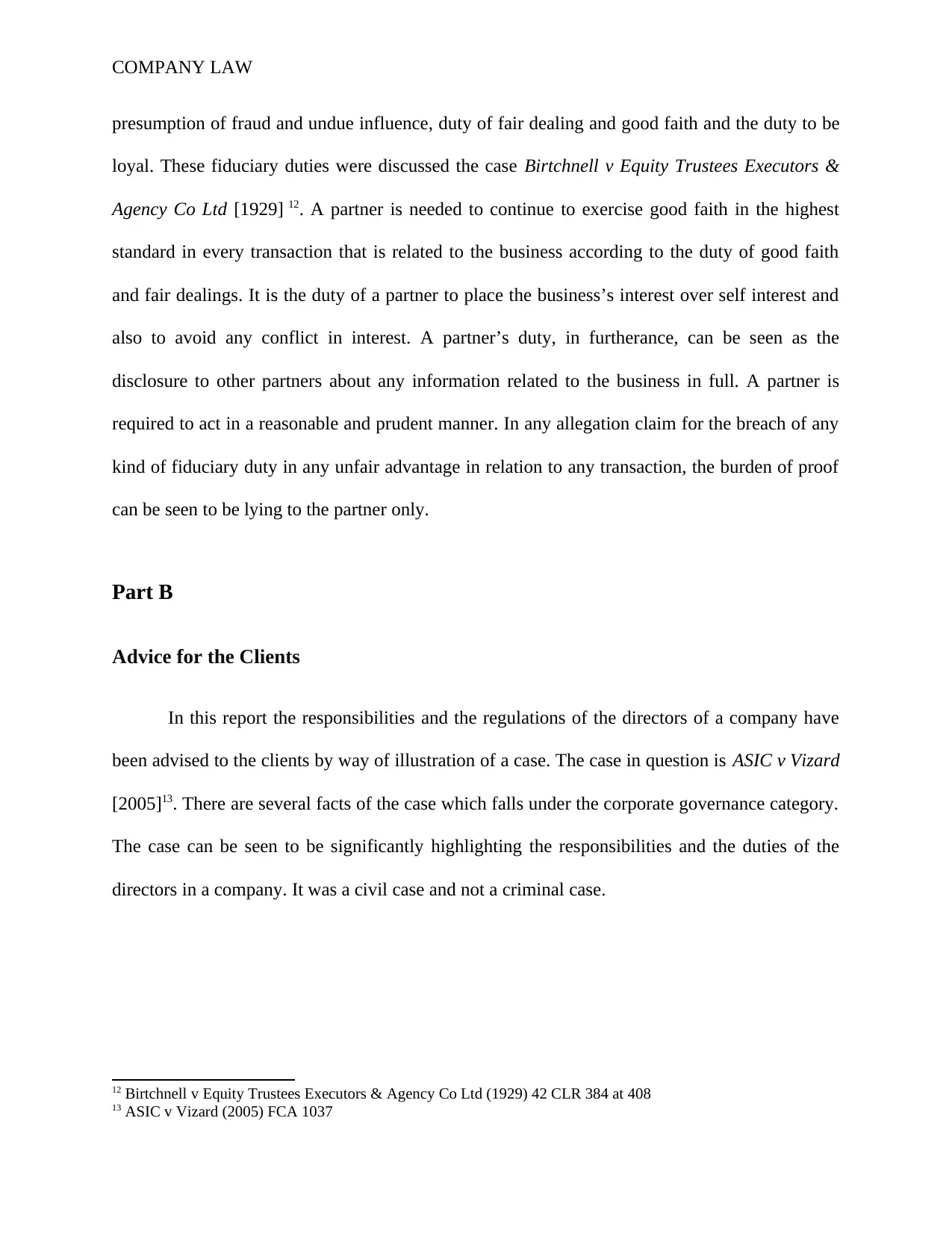
COMPANY LAW
presumption of fraud and undue influence, duty of fair dealing and good faith and the duty to be
loyal. These fiduciary duties were discussed the case Birtchnell v Equity Trustees Executors &
Agency Co Ltd [1929] 12. A partner is needed to continue to exercise good faith in the highest
standard in every transaction that is related to the business according to the duty of good faith
and fair dealings. It is the duty of a partner to place the business’s interest over self interest and
also to avoid any conflict in interest. A partner’s duty, in furtherance, can be seen as the
disclosure to other partners about any information related to the business in full. A partner is
required to act in a reasonable and prudent manner. In any allegation claim for the breach of any
kind of fiduciary duty in any unfair advantage in relation to any transaction, the burden of proof
can be seen to be lying to the partner only.
Part B
Advice for the Clients
In this report the responsibilities and the regulations of the directors of a company have
been advised to the clients by way of illustration of a case. The case in question is ASIC v Vizard
[2005]13. There are several facts of the case which falls under the corporate governance category.
The case can be seen to be significantly highlighting the responsibilities and the duties of the
directors in a company. It was a civil case and not a criminal case.
12 Birtchnell v Equity Trustees Executors & Agency Co Ltd (1929) 42 CLR 384 at 408
13 ASIC v Vizard (2005) FCA 1037
presumption of fraud and undue influence, duty of fair dealing and good faith and the duty to be
loyal. These fiduciary duties were discussed the case Birtchnell v Equity Trustees Executors &
Agency Co Ltd [1929] 12. A partner is needed to continue to exercise good faith in the highest
standard in every transaction that is related to the business according to the duty of good faith
and fair dealings. It is the duty of a partner to place the business’s interest over self interest and
also to avoid any conflict in interest. A partner’s duty, in furtherance, can be seen as the
disclosure to other partners about any information related to the business in full. A partner is
required to act in a reasonable and prudent manner. In any allegation claim for the breach of any
kind of fiduciary duty in any unfair advantage in relation to any transaction, the burden of proof
can be seen to be lying to the partner only.
Part B
Advice for the Clients
In this report the responsibilities and the regulations of the directors of a company have
been advised to the clients by way of illustration of a case. The case in question is ASIC v Vizard
[2005]13. There are several facts of the case which falls under the corporate governance category.
The case can be seen to be significantly highlighting the responsibilities and the duties of the
directors in a company. It was a civil case and not a criminal case.
12 Birtchnell v Equity Trustees Executors & Agency Co Ltd (1929) 42 CLR 384 at 408
13 ASIC v Vizard (2005) FCA 1037
Paraphrase This Document
Need a fresh take? Get an instant paraphrase of this document with our AI Paraphraser
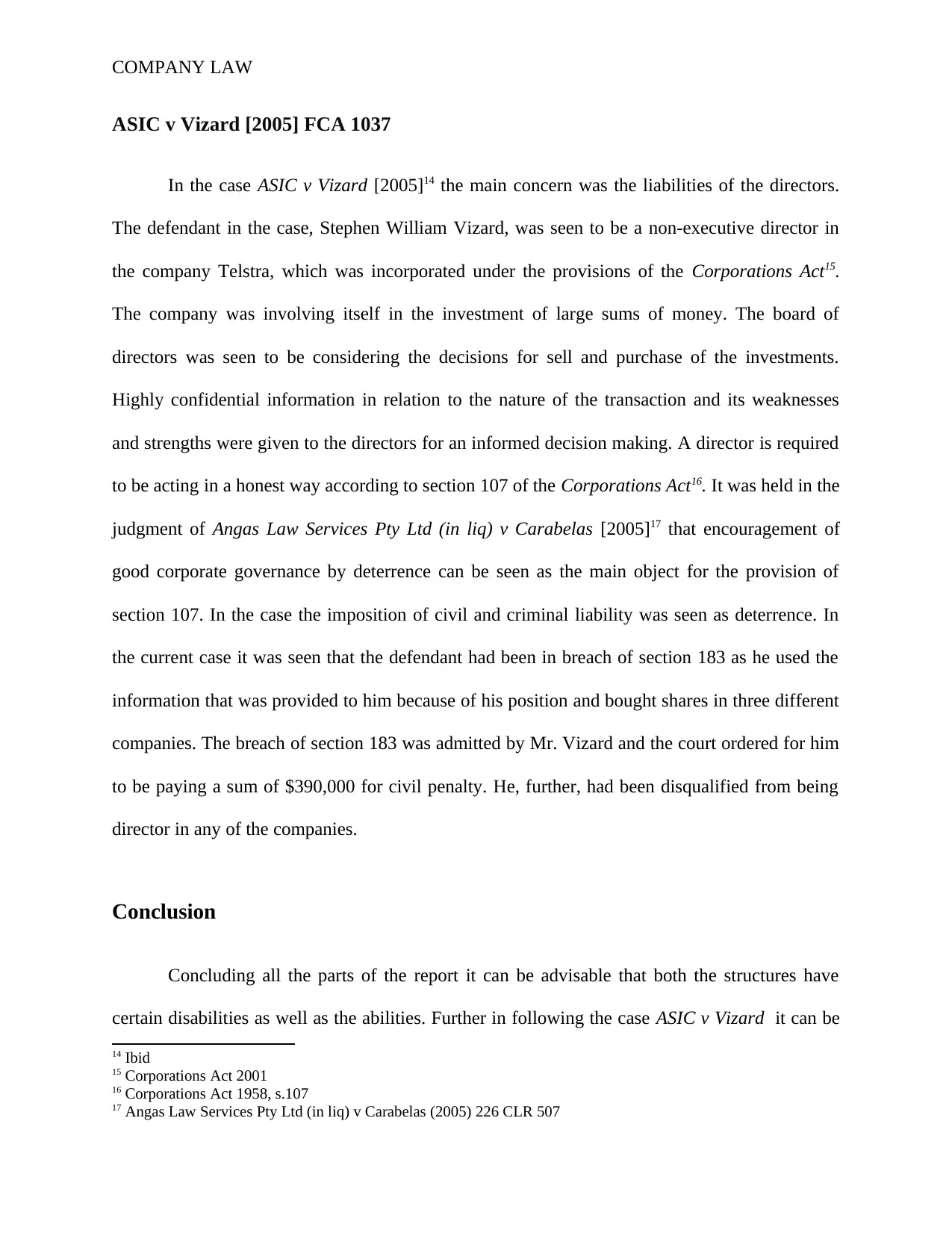
COMPANY LAW
ASIC v Vizard [2005] FCA 1037
In the case ASIC v Vizard [2005]14 the main concern was the liabilities of the directors.
The defendant in the case, Stephen William Vizard, was seen to be a non-executive director in
the company Telstra, which was incorporated under the provisions of the Corporations Act15.
The company was involving itself in the investment of large sums of money. The board of
directors was seen to be considering the decisions for sell and purchase of the investments.
Highly confidential information in relation to the nature of the transaction and its weaknesses
and strengths were given to the directors for an informed decision making. A director is required
to be acting in a honest way according to section 107 of the Corporations Act16. It was held in the
judgment of Angas Law Services Pty Ltd (in liq) v Carabelas [2005]17 that encouragement of
good corporate governance by deterrence can be seen as the main object for the provision of
section 107. In the case the imposition of civil and criminal liability was seen as deterrence. In
the current case it was seen that the defendant had been in breach of section 183 as he used the
information that was provided to him because of his position and bought shares in three different
companies. The breach of section 183 was admitted by Mr. Vizard and the court ordered for him
to be paying a sum of $390,000 for civil penalty. He, further, had been disqualified from being
director in any of the companies.
Conclusion
Concluding all the parts of the report it can be advisable that both the structures have
certain disabilities as well as the abilities. Further in following the case ASIC v Vizard it can be
14 Ibid
15 Corporations Act 2001
16 Corporations Act 1958, s.107
17 Angas Law Services Pty Ltd (in liq) v Carabelas (2005) 226 CLR 507
ASIC v Vizard [2005] FCA 1037
In the case ASIC v Vizard [2005]14 the main concern was the liabilities of the directors.
The defendant in the case, Stephen William Vizard, was seen to be a non-executive director in
the company Telstra, which was incorporated under the provisions of the Corporations Act15.
The company was involving itself in the investment of large sums of money. The board of
directors was seen to be considering the decisions for sell and purchase of the investments.
Highly confidential information in relation to the nature of the transaction and its weaknesses
and strengths were given to the directors for an informed decision making. A director is required
to be acting in a honest way according to section 107 of the Corporations Act16. It was held in the
judgment of Angas Law Services Pty Ltd (in liq) v Carabelas [2005]17 that encouragement of
good corporate governance by deterrence can be seen as the main object for the provision of
section 107. In the case the imposition of civil and criminal liability was seen as deterrence. In
the current case it was seen that the defendant had been in breach of section 183 as he used the
information that was provided to him because of his position and bought shares in three different
companies. The breach of section 183 was admitted by Mr. Vizard and the court ordered for him
to be paying a sum of $390,000 for civil penalty. He, further, had been disqualified from being
director in any of the companies.
Conclusion
Concluding all the parts of the report it can be advisable that both the structures have
certain disabilities as well as the abilities. Further in following the case ASIC v Vizard it can be
14 Ibid
15 Corporations Act 2001
16 Corporations Act 1958, s.107
17 Angas Law Services Pty Ltd (in liq) v Carabelas (2005) 226 CLR 507
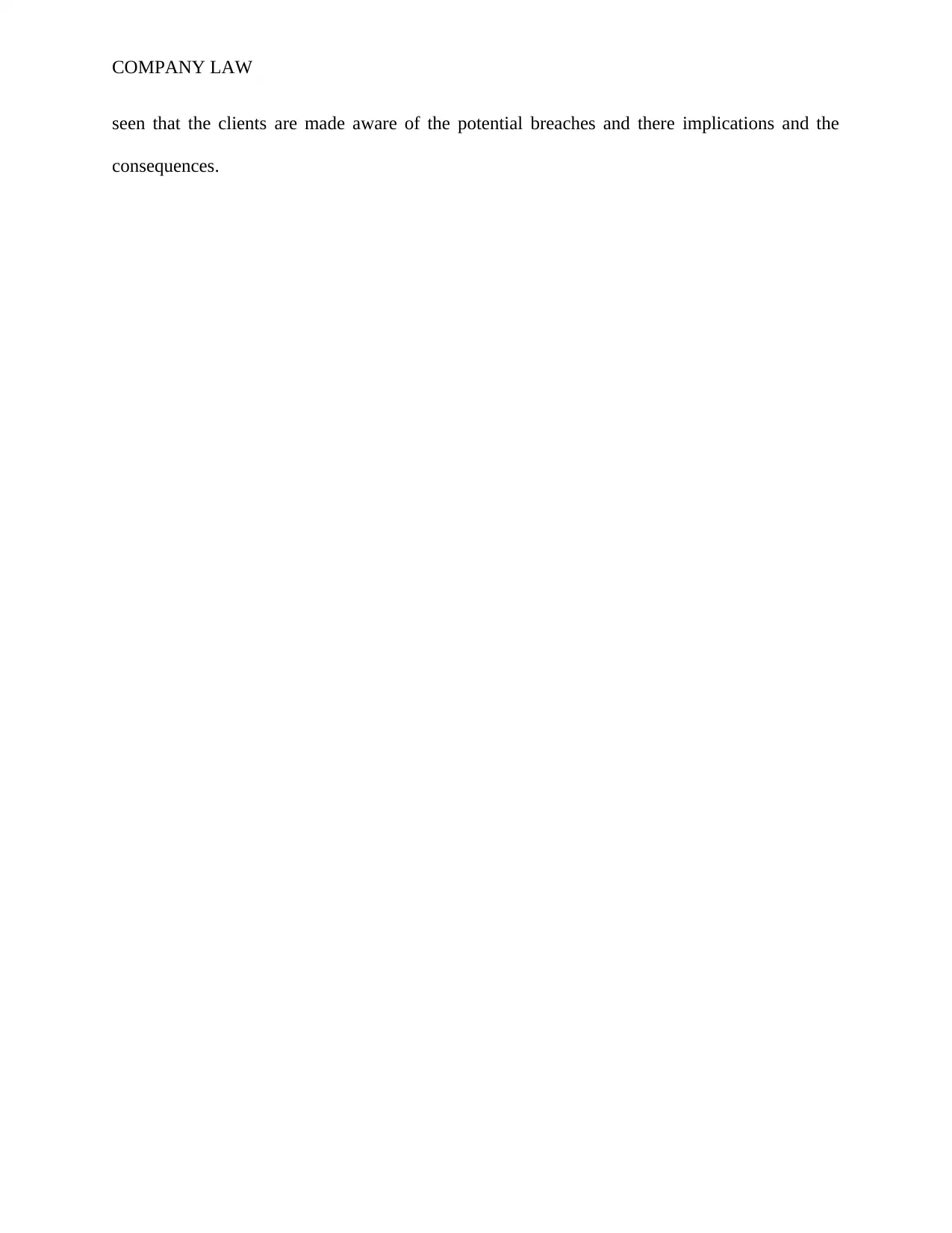
COMPANY LAW
seen that the clients are made aware of the potential breaches and there implications and the
consequences.
seen that the clients are made aware of the potential breaches and there implications and the
consequences.
⊘ This is a preview!⊘
Do you want full access?
Subscribe today to unlock all pages.

Trusted by 1+ million students worldwide

COMPANY LAW
1 out of 7
Related Documents
Your All-in-One AI-Powered Toolkit for Academic Success.
+13062052269
info@desklib.com
Available 24*7 on WhatsApp / Email
![[object Object]](/_next/static/media/star-bottom.7253800d.svg)
Unlock your academic potential
Copyright © 2020–2026 A2Z Services. All Rights Reserved. Developed and managed by ZUCOL.





